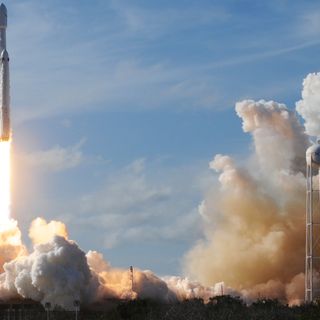Sometimes the future arrives overnight. Take SpaceX's February launch, when spent sections of the rocket guided themselves back from the edge of space, settling on the pad like improbably balanced telephone poles straight from science fiction.
SpaceX is merely the most visible company in a flourishing and successful US space industry that Australia's new space agency would do well to tap into.
Australians often ask "why should Australia do space?" (Tellingly, in the US the question is instead "Why doesn't Australia do space?")
Space matters for Australia
Space has moved from costing money to making money. Globally it is a $400 billion industry. Several new space companies are valued at more than $1 billion. Australia has a host of fledgling space companies (more than 50 at last count) competing for a slice of this growing sector.
Then there's the fact that satellites are 21st-century infrastructure, as economically important as roads and rail. Ten years ago, most people were lost without a map. Space-based GPS plus smartphones have made that a thing of the past, saving immeasurable minutes and marriages. Remote industries are being quietly revolutionised by the trifecta of GPS, cheap space-based images and ubiquitous satellite communications. Agriculture, mining and logistics are the three biggest beneficiaries.
National security, too, is space dependent. The Australian Defence Force relies on space for strategic intelligence and tactical warfighting. Recent investments, like $500 million to improve Australia's space-based intelligence, surveillance and reconnaissance capabilities, recognise the military's growing dependence on space.
The world has entered a new space era and the investment calculus has changed. Satellites are now smaller, cheaper and more capable thanks to smartphone electronics and more widely accepted standards. This has opened the door to countries like Australia which can develop innovative space applications without mammoth up-front costs, and seed space start-ups that can bootstrap their way to success.
So space matters for Australia. The billion-dollar question is how Australia can develop globally competitive capabilities without expensive, unsustainable government support.
Australian industry must partner up
Part of the answer lies in services that need our southern hemisphere location. Part is in focusing on space applications of existing Australian strengths like mining, cybersecurity and biomed. But the Australian game-changer is our close relationship with the globe's biggest space spender.
Partnerships matter because Australian space companies need access to customers, capital and experience. US industry can bring all three. It builds 60 per cent of the world's satellites, and spends more on space than all other nations combined.
First, the two countries already co-operate extensively on national security space activities. One recent estimate put Australian defence space spending at a billion dollars per year, mostly with the US. This foundation of trust goes a long way, and broadens the spectrum of potential projects.
Space for growth: Prospects for Australia-US civil space cooperation

Second, the US is actively asking allies to become more space capable. Satellites are "the stuff of which American military primacy is made", as US strategist Elbridge Colby put it; immensely capable but also fragile and vulnerable to deliberate attack or accidental mishap. One leg of the US response to this fragility is to encourage allies to develop nimble space capabilities to complement larger US satellites. Australia's emerging companies and universities can meet this need.
Third, Australian strengths tie in well with US gaps. For example, Australia is positioned to watch the southern hemisphere skies for damaging space debris or belligerent satellites. As well as keeping an eye on these celestial highways, Australia can help develop the "rules of the road", the standards of behaviour that satellite operators should follow.
US 'big budget' mindset a distraction
The US cannot develop these standards of behaviour unilaterally given more than 90 countries now have satellites in orbit. This is not an altruistic motivation: a rogue operator disrupting or destroying satellites Australia relies on — like those of Optus, NBN or the ADF — would cause serious disruption and economic loss.
The relationship will not be all smooth sailing. The "big budget" mindset still pervades some US space organisations and Australia's innovative companies need to avoid being swept up in it.
Regulations don't help either, with US export controls loosening but still a major headache for space companies looking to do business across the Pacific.
Ironically, Australia's dynamic space companies cannot survive in a vacuum.
Partnerships matter, and it is a fortunate coincidence that Australia needs help in maturing its space industry exactly when the US is asking allies to become more space capable.






